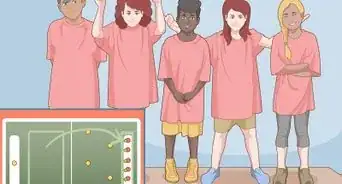This article was co-authored by wikiHow Staff. Our trained team of editors and researchers validate articles for accuracy and comprehensiveness. wikiHow's Content Management Team carefully monitors the work from our editorial staff to ensure that each article is backed by trusted research and meets our high quality standards.
There are 10 references cited in this article, which can be found at the bottom of the page.
This article has been viewed 57,163 times.
Learn more...
As a conservative student at a liberal college, you may feel confident, though isolated in your beliefs. It may be hard to find others in your community who understand you. Even in the classroom, you may feel like the instructors are biased, not willing to listen to your perspective, or respect your answers to questions. Being open to sharing your beliefs may help you find others who agree with you, and may even help bring a more balanced perspective to your campus. If you want to be a conservative student at a liberal college, we’ll walk you through the various ways you can survive alongside students who may not share your perspective.
Steps
Educating Yourself and Others
-
1State your opinion in class. Even if it is unpopular, you have the right to express your point of view. A good professor will be respectful of differences in opinion, and will be able to create a good discussion to the benefit of everyone's education.
-
2Do your homework. Stay current with reading assignments and papers. Being a good student lends credibility to your arguments. Read beyond the text to back up your beliefs with additional insights.Advertisement
-
3Respect your liberal professors. It is not your imagination, professors are generally liberal,[1] and have even moved further to the left in recent years.[2] Nevertheless, offer them your respect. In spite of their political beliefs, they are still knowledgeable in their field, and have a lot to offer your education. Once in a while, you may luck out with a more moderate or conservative professors. You may see them in smaller colleges, trade schools, and private colleges.
-
4Discuss, don't battle. Keep your conversations casual and civil. You will make friends instead of enemies. People are more receptive to new ideas if everyone remains friendly![3]
- If your opponent becomes angry, try not to feed into it. It makes you the bigger person to try to deescalate the situation and remain calm.
- It is up to you if you want to continue to engage with someone who is being hostile. To end the conversation, try saying, “I think we should revisit this another time when we're not so worked up. Can we agree to disagree in the meantime?” and change the subject.
-
5Take your learning beyond the classroom walls. You are not limited to your classes for an education. Take the initiative to teach yourself.
- Find a recommended reading list of conservative works and read these in your spare time.
- Volunteer to work on the campaign of a candidate whose ideals you support. This is also great work experience.
- Help get people registered to vote.
- Be a poll worker on Election Day.
-
6Make sure your school has conservative publications. Check your school's library and make sure there is a broad spectrum of political writings represented. Talk to your school's librarian if you think something is missing.
-
7Be aware of your own biases. How has your upbringing shaped you? Reflect on your heritage and life experience and consider how this has shaped your belief system. Your culture, family, socioeconomic status, and more come into play when you develop your political beliefs.[4]
- Realize that your classmates' upbringings also influence their beliefs and create biases. Learning more about your classmates' backgrounds, as well as sharing yours, can increase mutual understanding. Try asking, “What was your family like growing up? What was your neighborhood like?”
Finding Like-Minded Individuals
-
1Know you're not alone. College students as a whole are generally more liberal, but that doesn't mean there are no other conservative college students even on your liberal campus. This can be an opportunity to be a leader and organize like-minded students.
- Post flyers around your school or use social media to look for people to join a conservative student group.
- If there isn't a chapter of such a group on your campus, start one!
-
2Cast a wider net. Broaden your search for fellow conservatives to include your local community, houses of worship, local government, and political parties. As a bonus, getting connected at the local level can give you a real opportunity to affect political change.
-
3Learn more about your classmates. Just because someone identifies as liberal doesn't mean they don't have some conservative opinions. In spite of increasing polarization, it doesn't mean that you will not be able to find some common, middle ground.[5] Take the time to learn about your classmates' beliefs, and you may be surprised at what you have in common.
- Your fellow students will not be as liberal as their professors. Incoming freshmen across all universities are more likely to identify as politically moderate and sometimes even conservative.[6] Therefore, you may find some unexpected allies in class discussions.
-
4Look online. The internet is full of a wide range of political beliefs. If you are unsuccessful in finding people on your campus or in your community to talk to, you will find them online.
-
5Consider transferring. If all else fails, and you do not feel a part of your campus community, look into changing schools. Look for a school that is more in line with your conservative beliefs.
- While it is important to stand up for what you believe in, arguing all the time and feeling like you are all alone can be harmful to your mental health. [7] There is no shame in finding a place where you don't feel like you are constantly fighting a battle!
Standing Up for Your Beliefs
-
1Stay true to yourself. Don't feel like you need to conform to whatever is popular. Your opinion, though different, is still valuable.
- Be open-minded and receptive to hearing new ideas, but this does not mean you need to agree with them. Education is about being exposed to and analyzing different perspectives.
-
2Learn how to debate. Read books on the subject, practice your skills, or even join a debate team. This will help you in your classroom discussions, and is a valuable skill to have in life.[8]
- Stay calm and respectful during debates. Avoid loaded language and name-calling. Instead of “Obamacare was idiotic. He was clearly conspiring with insurance companies,” try saying “Obamacare has become a bureaucratic nightmare, and now insurance companies are profiting off it.”[9]
- Back up your arguments with facts and statistics. The argument that Ronald Reagan was the best President for the economy will be stronger if you can support it. Try saying, “During Reagan's presidency, he cut the top tax rate from 70 percent to 28 percent. Freeing up this money from the government allowed industry to create jobs and innovation in the country.”[10]
-
3Pick your battles. Expressing your frustration at every liberal perspective will not endear you, or your points of view, to others. Sometimes it may be better to remain silent, or speak with your instructor after class.
- Try saying, “Sometimes I feel like I am always the person bringing this up, but I didn't think our discussion on drug offenders offered all perspectives. Instead of raising my hand and having everyone get frustrated at me again, I decided to wait until after class to talk to you.”
-
4Take action. If you feel the classes are too left-leaning, and that your instructors do not do a good job sharing all points of view, be an advocate for your education and work for change.
- Write a letter and present it to your principal, dean, school board, or university official. Send it to your school newspaper or local paper as well.
- Run for student government. While you may not win due to your school's demographics, your presence can bring the issue to the table and start a conversation.
References
- ↑ http://www.washingtonpost.com/wp-dyn/articles/A8427-2005Mar28.html
- ↑ https://www.insidehighered.com/news/2012/10/24/survey-finds-professors-already-liberal-have-moved-further-left
- ↑ http://www.latimes.com/science/sciencenow/la-sci-sn-paradoxical-thinking-20140715-story.html
- ↑ http://www.ushistory.org/gov/4b.asp
- ↑ http://www.people-press.org/2014/06/12/political-polarization-in-the-american-public/
- ↑ https://www.washingtonpost.com/news/wonk/wp/2016/01/11/the-dramatic-shift-among-college-professors-thats-hurting-students-education/
- ↑ https://newrepublic.com/article/113176/science-loneliness-how-isolation-can-kill-you
- ↑ http://idebate.org/about/debate/why
- ↑ http://www.latimes.com/business/hiltzik/la-fi-hiltzik-obamacare-profits-20160427-snap-htmlstory.html













































































